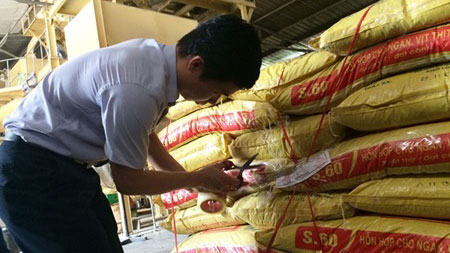Gov't to crack down on dangerous animal feed
Authorities plan to intensify checks of animal feed production and trading establishments and pig farming and slaughterhouses in the south from November to next February.
Chu Dinh Khu, head of the department's Animal Feed Division of the Animal Husbandry Department, said they would focus on small and medium-sized production establishments and those without a clear place of origin.
The inspection team will check the implementation of legal regulations related to the use of banned substances, Clenbuterol, Salbutamol and Ractopamine, in pig and beef breeding and the Vat Yellow in poultry breeding, he said.
The move aims to improve the quality and safety of feed, and anyone found adding banned substances to animal feed or feeding them to animals would be severely penalised.
Nguyen Xuan Duong, deputy head of the Animal Husbandry Department, said Vietnam had banned the use of beta-agonist, including Clenbuterol, Salbutamol and Ractopamine, in husbandry for more than a decade.
 |
| Authorities plan to intensify checks of animal feed production and trading establishments and pig farming and slaughterhouses in the south from November to next February. — Photozing.vn |
The chemicals were used to stimulate growth of animals and make them lean.
The substances, however, are still being widely used by pig breeders, even large-scale breeding farms, he said.
In the first 10 months of the year, of 19 feed samples collected, one had tested positive for Salbutamol, Khu said.
One out of 28 feed samples taken at breeding farms in Dong Nai had tested positive for Salbutamol, and 29 out of 263 urine samples taken at breeding farms in Dong Nai, An Giang and Tien Giang had also tested positive for Salbutamol, he said.
Through inspections at slaughterhouses in Dak Nong, Dong Nai, Ho Chi Minh City and Tay Ninh, inspection agencies found 106 out of 587 pig urine samples containing the banned substance, he added.
Delegates at the seminar suggested measures to mitigate the use of banned substances in animal breeding.
They suggested localities to strengthen awareness among farmers, consumers and management agencies about the possible effects of these substances on human health as well as its adverse impact on the image and competitiveness of the domestic husbandry industry.
They proposed more severe penalties to deter repeat violations.
Khu said relevant ministries should also inspect the use of banned substances.
Kieu Minh Luc of CP Vietnam Corporation suggested stepping up the development of closed breeding chains (feed-farm-food) to help reduce costs and enable better quality control.
